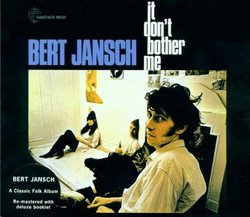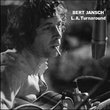| All Artists: Bert Jansch Title: It Don't Bother Me Members Wishing: 4 Total Copies: 0 Label: Sanctuary UK Release Date: 2/26/2008 Album Type: Import Genres: Folk, International Music, Pop, Rock Styles: Traditional Folk, British & Celtic Folk, Folk Rock Number of Discs: 1 SwapaCD Credits: 1 UPC: 766487335126 |
Search - Bert Jansch :: It Don't Bother Me
 | Bert Jansch It Don't Bother Me Genres: Folk, International Music, Pop, Rock
UK reissue of the influential British folk artist's sophomore album, originally released in 1965. 14 tracks including, 'Anti Apartheid' & 'Lucky Thirteen'. The CD housed in a slipcase comes with a 12 page booklet wi... more » |
Larger Image |
CD DetailsSynopsis
Album Description UK reissue of the influential British folk artist's sophomore album, originally released in 1965. 14 tracks including, 'Anti Apartheid' & 'Lucky Thirteen'. The CD housed in a slipcase comes with a 12 page booklet with informative sleevenotes. 2001 release. Similar CDs
|
CD ReviewsA continuation of his first C. H Smith | Bowling Green, Kentucky United States | 10/28/2001 (4 out of 5 stars) "This, Jansch's second album, followed the landmark first's release by less than a year, still in 1965. It pretty much represents a continuation of the first, though here he plays a couple of works with John Renbourn on second guitar (the exotic North African-sounding vocal piece 'My Lover,' and the incredible instrumental 'Lucky Thirteen'), and the traditional piece '900 Miles,' on which he shows that he can play the banjo as well as the guitar. Other high points include the interesting solo instrumental 'The Wheel,' the chilling commentary title cut, and the more lighthearted 'As the Day Grows Longer Now.' Be ready for a couple of cuts that are not so strong, however. Still, with perhaps one more strong cut this release most likely would have had nearly the same effect as its predecessor had it been released first. Together, these two albums added to Davy Graham's pioneer work in setting the context for the notion of the "contemporary acoustic guitarist." For Jansch, in the next year it would be on to the beginnings of British folk-rock, with the albums "Jack Orion" and "Bert and John," and shortly thereafter, the coming together of Pentangle." A pure example of the triumph of talent over technology nickelcandy | Calgary, Alberta Canada | 07/24/2000 (5 out of 5 stars) "too often the cheesy pop world drags me down and under: passionless vocals, over production, and dumbed down keyboard hooks designed to sell some big labels latest package. i am glad to say that bert jansch is the antithesis to the sugar sweet radio candy gumming up so many peoples ears. his heart felt singing (with that classic-folk-tenor-throaty-break), mind-blowing guitar playing, and cutting delivery add up to an undeniably brilliant musician and album. repeat: MIND BLOWING GUITAR PLAYING. everything about bert jansch is so stunningly original -there is no one in the world who plays like him- and his list of devoted followers speaks for itself: jimmy page, johnny marr, bernard butler, jarvis cocker, neil young, etc. bert jansch is a living legend, and i strongly encourage anyone, young and old, who appreciates music with real soul and talent to check out any bert jansch you can get your hands on. note to musicians: this mans music is an absolute must in your collection." Very early Bert C. H Smith | Bowling Green, Kentucky United States | 09/24/2000 (5 out of 5 stars) ""It Don't Bother Me" was Jansch's second album, released originally in 1965 on the old Transatlantic label. It was apparently recorded on a small portable tape recorder, under very intimate circumstances, and with no accompanying musicians (except his buddy John Renbourn on a couple of cuts). This present issue is actually not the original lineup of songs, which is a good thing because there were two or three duds on it, and the extra material more than makes up for them. The original was a continuation of his epoch-making first album; this compilation brings in material from the shortly thereafter recorded "Bert and John" (called "Stepping Stones" in the U.S.). My favorite cuts here are 'Soho,' 'Lucky Thirteen,' and 'My Lover,' but ask twenty different people and you'd get twenty different answers."
|

 Track Listings (14) - Disc #1
Track Listings (14) - Disc #1